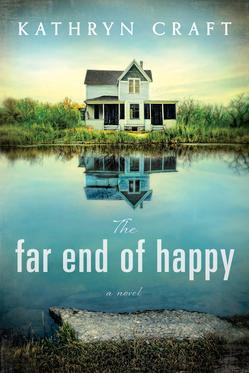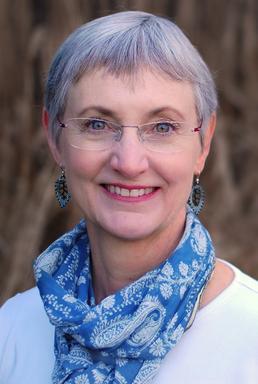Kathryn Craft is the author of The Art of Falling and the new release, The Far End of Happy, a fictionalized account of the day her first husband choose to end his life in a suicide stand-off at the home they shared. Kathryn spoke to me about her decisions to use fiction to tell this story and why she wants us all to choose this day to see beauty in the world around us.
So you will probably be asked this question a lot, but probably one of the biggest hooks for this book is that your first husband ended his life in a suicide standoff. Why did you turn to fiction for this instead of memoir?
In the seventeen years since his death, I drafted a lot of memoir material. One bit at a time, in small story arcs with beginnings, middles, and ends, I made sense of the chaos threatening to consume our lives (our sons were eight and ten at the time of their father's suicide). The exercise was healing. Some of these pieces turned into published essays.
I have three main reasons for changing tack. The first is that memoir, by definition, is a personal account. I couldn't ignore the community response that convinced me of the far-reaching impact of my husband's act. My sons' school was locked down. People couldn't get home from work. A veterinarian from a few towns over, for whom I had just designed marketing materials, had nightmares about her children encountering soldiers while playing on their backyard swing set. The story wasn't only about me.
Secondly, as I wrote through my husband's decline in the final years of our marriage and headed toward the boys' and my later healing, I kept coming back to one thing: the way the standoff had seared into our lives. The best way to communicate that message, it seemed, was through structure: to constrain my story to the events of those twelve hours.
The third reason is more pragmatic: my novel, The Art of Falling, sold first. After working so hard to create a readership for my fiction, I didn't see the point in starting all over with an audience that loved memoir.
What process did you use for writing this book? What decisions did you need to make about what to fictionalize and what to leave intact? Did you have journals like Ronnie?
Even after all these years my memories of the weeks surrounding the standoff were still keen, but yes, I was able to check facts against my journals.
My decision about what to fictionalize and what to leave was informed, as in any novel, by story structure. The protagonist, Ronnie, had a clear goal at the start of the novel: she was dissolving the marriage and her husband had promised to move out that day. Despite a previous suicide threat, she had no clue what he truly meant by this promise. His intent to kill himself put her determination to end the marriage to the ultimate test. Anything that supported that story stayed, anything that didn't was deleted. The first challenge in novelizing was to give Ronnie a relatable growth arc over only twelve hours.
Next, while orchestrating my cast, I realized that shock had immobilized my parents, who were with me that day, ruling them out as viable novel characters. This allowed me to think about what sort of character would help drive the conflict, and what backstory motivations they might have for doing so. To suggest Ronnie's ongoing struggles beyond the suicide I came up with a mother for her who had her own unresolved issues concerning suicide, and made her best friends with the suicide victim's mother, who had her own shameful secrets. In order to spread the stakes over a larger cast, I compressed the timeline so that more true events could come to a head on that day.
Despite this fictionalizing, the result, for me, feels very true.
In writing this, you took a tragic and painful event from your own life and immersed it fully, what did you learn about yourself? What did you learn about writing?
Well, one thing I learned is that when push comes to shove, I can write a book in nine months. Considering I polished my debut over eight years, that was quite a feat! And I am not a fast writer. I work in layers, over and over, and during the final three months I worked fifteen-hour days, seven days a week. The surprise to me wasn't the perseverance--I knew of my stick-toitiveness from an early age. The surprise was how much the project evolved through this focused attention in the final weeks.
A lot of writers take to the page to better understand the world around them. After re-examining the past through this fictional lens, what do you wish you understood more? Are you done tackling the topic of suicide in your fiction or do you still see more work to be done here?
The experience of my first husband's suicide, and my journey since, has taught me that we can never truly know or understand another human being--or ourselves, for that matter. I don't mean to sound cynical. I just mean that we are all works in progress, consistent in some essential ways (say, genetic material) while our amazing brains are always sorting new perceptions with regard to age, experience, and new incoming information. Who knows, exactly, why anyone does anything? In real life we can only guess.
Story allows us a way to examine cause and effect in a controlled, engaging way. It is true that the suicide provoked my interest in this; I am endlessly fascinated with what makes people decide that life is worth living. One factor that I'm sure of is our need for relationship. Our relationships must adapt as we change, and since we all have pressures that can make us more or less observant of one another at any given time, all sorts of important things can go wrong. So I don't see me running out of story ideas any time soon.
What is your advice to someone that wants to write about their life but feels thwarted in some way either from being too close to the situation or fearful of hurting others with the writing? How did you grapple with these issues yourself?
If you feel too close you probably are. When situated up close we have access to amazing detail, so take notes while you can. But context only comes from the perspective that time and distance allow. Your readers want that context. That perspective. It's what story does best.
If you fear hurting others, I think you really have to examine your motives for telling that part of the story. Even memoir isn't all-inclusive--you are pulling out select scenes that can show your personal truth. Stay away from your opinions "about" other people and allow their own relatable motives to shine through your work.
Sharing personal truth is never easy, and there will be family members, friends, and colleagues who don't understand your need to do so. But if it is the very truth of your story that makes you quake, it's exactly what we need more of in the world.
You can also purge negative feelings about the project by helping others, as I hope to do with my associated #choosethisday Twitter campaign.
Tell me more about #choosethisday.
After October 20, 1997--the day my husband chose death over life--"choose this day" became my mantra. Each day, no matter how sad or horrified or frustrated I felt by his suicide and the emotional mess it left behind, I chose life--and with this simple daily act, my sense of empowerment grew. I want to share this notion.
Throughout the month of May I am asking people on Twitter to post an empowering, positive message or quote using the #choosethisday hashtag. I wanted to begin May 1 because of "May Day," an ancient celebration of renewal, and "mayday," a cry for help--together, the two concepts advance the message of positivity and mutual support that may lift up those who are hurting.
Every 12.8 minutes we lose someone in this country to despair. Why, when it may be possible to live through and beyond that despair to a productive life? Our human resources are precious. Let's reach out and see if we can make a difference.
If you want to tweet with Kathryn Craft using #choosethisday, you can find her on Twitter at @kcraftwriter.


